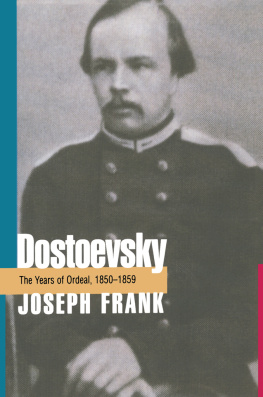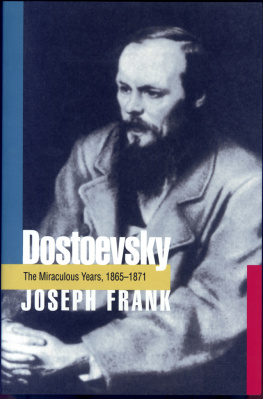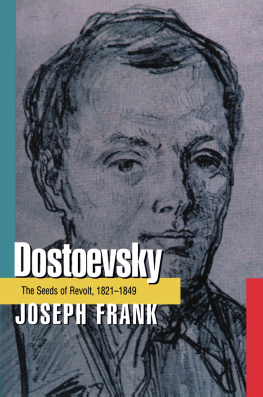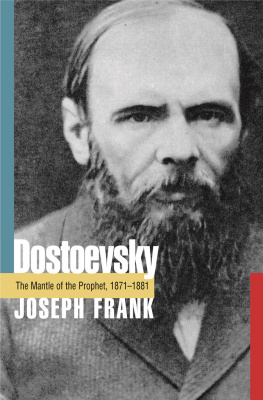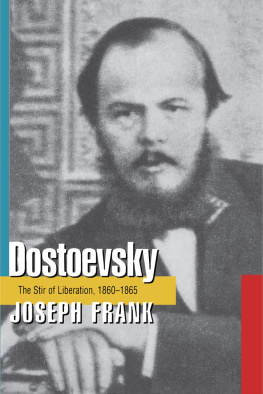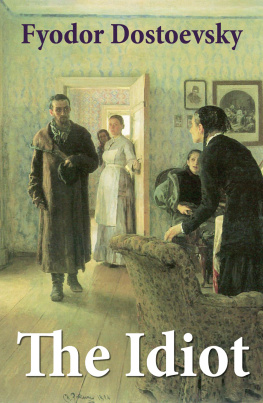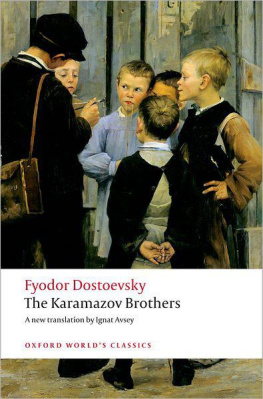Joseph Frank - Dostoevsky: The Years of Ordeal, 1850-1859
Here you can read online Joseph Frank - Dostoevsky: The Years of Ordeal, 1850-1859 full text of the book (entire story) in english for free. Download pdf and epub, get meaning, cover and reviews about this ebook. year: 2020, publisher: Princeton University Press, genre: Non-fiction / History. Description of the work, (preface) as well as reviews are available. Best literature library LitArk.com created for fans of good reading and offers a wide selection of genres:
Romance novel
Science fiction
Adventure
Detective
Science
History
Home and family
Prose
Art
Politics
Computer
Non-fiction
Religion
Business
Children
Humor
Choose a favorite category and find really read worthwhile books. Enjoy immersion in the world of imagination, feel the emotions of the characters or learn something new for yourself, make an fascinating discovery.
- Book:Dostoevsky: The Years of Ordeal, 1850-1859
- Author:
- Publisher:Princeton University Press
- Genre:
- Year:2020
- Rating:4 / 5
- Favourites:Add to favourites
- Your mark:
- 80
- 1
- 2
- 3
- 4
- 5
Dostoevsky: The Years of Ordeal, 1850-1859: summary, description and annotation
We offer to read an annotation, description, summary or preface (depends on what the author of the book "Dostoevsky: The Years of Ordeal, 1850-1859" wrote himself). If you haven't found the necessary information about the book — write in the comments, we will try to find it.
Dostoevsky: The Years of Ordeal, 1850-1859 — read online for free the complete book (whole text) full work
Below is the text of the book, divided by pages. System saving the place of the last page read, allows you to conveniently read the book "Dostoevsky: The Years of Ordeal, 1850-1859" online for free, without having to search again every time where you left off. Put a bookmark, and you can go to the page where you finished reading at any time.
Font size:
Interval:
Bookmark:

The Years of Ordeal
1850-1859
JOSEPH FRANK
PRINCETON UNIVERSITY
PRESS
Copyright by Princeton University Press
Published by Princeton University Press, 41 William Street,
Princeton, New Jersey
All Rights Reserved
Library of Congress Cataloging in Publication Data will
be found on the last printed page of this book
ISBN 0-691-06576-4
ISBN 0-691-01422-1 (pbk.)
eISBN 978-0-691-20938-8 (ebook)
R0
Dedicated to the memory of
Rufus W. Mathewson, Jr.
(1918-1978)
An inspiring Slavist and
a never-to-be-forgotten
friend
ix
xi
xv
Unless otherwise noted, all illustrations are from Feodor Mikhailovich Dostoevsky v Portretakh, illyustratsiyakh, dokumentakh, ed. V. S. Nechaeva (Moscow, 1972).
The present volume is the second in a series dealing with the life and works of Dostoevsky. It will be followed shortly by a third devoted to the next five years of Dostoevskys life. His literary production was so abundant during this relatively short stretch of time, and Dostoevsky was so intimately involved in all the peripeties of this dramatic moment in Russian history, that it has required a separate volume to depict him adequately at this juncture. This third volume is in the final stages of revision, and should not take too long to appear after the publication of the present one.
The favorable reception accorded my first book was very gratifying, and I should like to thank all those who, whether in public print or private correspondence, expressed their approval. Nothing could be more encouraging to an author engaged in so ambitious an undertaking, whose completion still involves many more years of labor.
This response also reassured me that the method I had chosen to followthe subordination of Dostoevskys private life to a depiction of his interconnection with the literary and social-cultural history of his timeanswered a widely felt need among those who turn to biographies of great writers because of their interest in them as writers. Such an interest cannot be satisfied if most space is given by the biographer to an account of day-to-day existence or events, or if the works are simply dissolved into a running account of the experiences which may (or may not) have served as their genesis. To grasp, so far as possible, the creative process by which life is transformed into art, the experience of the life must be apprehended and organized, without any violation of the historical record, so as to clarify this mysterious mutation. And this can only be done if the life is constantly viewed through the focus of, and in terms of, the work, rather than the more usual way of regarding the work only as a more or less incidental byproduct of the life.
As I now realize, it was not very difficult to maintain such a focus in my first volume, where Dostoevskys life could largely be followed through his affiliations with the various literary and social-political circles of the 1840s. The present book posed quite a different problem, since Dostoevskys life during these ten years was spent first in solitary confinement, then in a prison camp in Siberia, and finally as a soldier in one of the Siberian regiments of the Russian Army. He was physically thousands of miles away from the centers of Russian literary activity, and for four years was even cut off from all correspondence with the outside world.
It thus proved necessary to depict him much more in isolation (not social, of course, but cultural) than I had done earlier, and this gave me a good deal of trouble. It proved very difficult to shape the chapters dealing with the prison-camp years according to the perspective that I had chosen, and particularly to interpret the most crucial event of these yearswhat Dostoevsky called the regeneration of my convictionsin such terms. Most earlier writers had just contented themselves with a string of quotations from Dostoevsky that explained nothing, or else followed Freuds psychoanalytic speculations, despite their clear inability, on any close examination, to fit the facts (Dostoevsky exhibited no sense of guilt whatever toward the Tsar-Father but only toward the people). I was thus forced to re-examine the question anew; and this led me to focus on aspects of the situation that had been more or less overlooked, such as the catalytic importance of Dostoevskys relation to his Polish fellow prisoners. My account, in any case, keeps its eye on the meaning these experiences assumed for him, and their determining role both in causing him to reject certain elements of his past and in preparing the way for his future ideologicaland hence also artisticevolution.
Furthermore, Dostoevskys correspondence, both before and after this period, reveals his desperate eagerness not to lose contact with what was going on in Russian culture; and I place this feature of his life in the foreground of my canvas, to the neglect of a fuller and more picturesque deployment of the available documentation. I might add that this effort led to the unexpected but happy consequence of causing me to explore more intensively than had yet been done certain rather neglected material (such as the correspondence between Dostoevsky and Aleksey Pleshcheev, of which only Pleshcheevs letters have survived). These texts turned out to yield valuable inferential evidence concerning Dostoevskys reactions to the Russian cultural scene in the mid-1850s, and they thus help to fill out the picture of this obscure period of his life.
Inevitably, however, events such as his first serious love affair and his marriage, which occurred during the years portrayed in this volume, required a fuller biographical treatment than his private life had received in the first. For I did not want to be caught in the same rather absurd position as Boris Eikhenbaum, a critic I greatly admire and whose three-volume work on Tolstoy (unfortunately left incomplete at the time of his death) has served as an inspiration for my own. One of the founders of Russian Formalism, and like all members of this school a ferocious opponent of the confusion of art with life, he later undertook a massive historical study of Tolstoybut only, as he cautiously explained, on the level of literary mores (that is, the literary and social-cultural history of the time). As a result, at the end of a richly detailed discussion in his second volume of Tolstoys struggles with his school for peasant children and of his theories of pedagogy, Eikhenbaum concludes: Tolstoy did not become an expatriate, but closed the school, married, and entrenched himself in Yasnaya Polyanalike a feudal lord in his castle. So much for the marriage! Notwithstanding my immense respect for Eikenbaum, and the refreshing stimulus provided by such jaunty iconoclasm, it seemed to me that one could yield a bit more to real life while still retaining the primary interest in literary mores that pushed him to so ascetic an extreme.
Work on the present book, in any case, persuaded me that I had drawn too sharp a distinction when I said, in the preface to my first, that my work is ... not a biography; I would still maintain, however, that those who come to my pages seeking conventional biography are apt to be disappointed. The critical responses also helped to change my mind, since the first book was invariably taken, not as any attempt to break with biography entirely, but rather as a welcome effort to extend the limits of the genre. Indeed, I am now happy to make my own the observation of a distinguished commentator, who generously spoke of my promising experiment in fusing biography, literary criticism and social-cultural history. Such a fusion, as I now realize, is exactly what I have been trying to achieve. Whether I have succeeded in doing so here must be left for the reader to judge.
Font size:
Interval:
Bookmark:
Similar books «Dostoevsky: The Years of Ordeal, 1850-1859»
Look at similar books to Dostoevsky: The Years of Ordeal, 1850-1859. We have selected literature similar in name and meaning in the hope of providing readers with more options to find new, interesting, not yet read works.
Discussion, reviews of the book Dostoevsky: The Years of Ordeal, 1850-1859 and just readers' own opinions. Leave your comments, write what you think about the work, its meaning or the main characters. Specify what exactly you liked and what you didn't like, and why you think so.

